高二英语上学期unit-1(1)
- 格式:ppt
- 大小:430.50 KB
- 文档页数:25
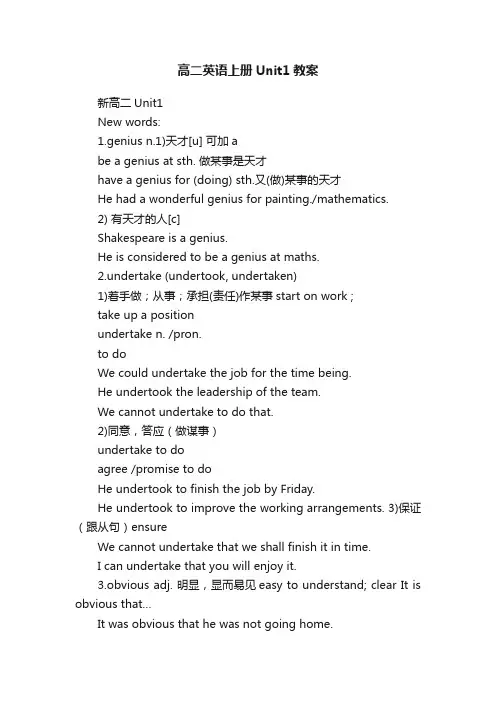
高二英语上册Unit1教案新高二Unit1New words:1.genius n.1)天才[u] 可加abe a genius at sth. 做某事是天才have a genius for (doing) sth.又(做)某事的天才He had a wonderful genius for painting./mathematics.2) 有天才的人[c]Shakespeare is a genius.He is considered to be a genius at maths.2.undertake (undertook, undertaken)1)着手做;从事;承担(责任)作某事start on work ;take up a positionundertake n. /pron.to doWe could undertake the job for the time being.He undertook the leadership of the team.We cannot undertake to do that.2)同意,答应(做谋事)undertake to doagree /promise to doHe undertook to finish the job by Friday.He undertook to improve the working arrangements. 3)保证(跟从句)ensureWe cannot undertake that we shall finish it in time.I can undertake that you will enjoy it.3.obvious adj. 明显,显而易见easy to understand; clear It is obvious that…It was obvious that he was not going home.It is obvious that he is lying.obviously adv. 显而易见地can be easily seen Obviously you didn’t read it.4.curious adj. 好奇的,好求知的,爱打听隐私的be curious aboutto doThe boy was curious about everything he saw.He was curious to know what was happening in the office.curiously adv.好奇地,说也奇怪Philip looked curiously at the people.Obviously enough he had never seen the little girl.5.debate n.辩论;争论[c]a long debatevi. 1) debate about sth.argue with sb.quarrelI debated (about) the question with Mary.考虑,讨论(如何好)debate whether to dowhetherI debate whether to accept the job.We were debating where we should go.I’m just debating whether to go or stay.2)argue sb. into (out of ) doing说服某人做(不做)某事He argued her into( out of ) going.6.promising adj. 有希望的,有前途的a promising leaderv.1)答应;许下诺言promise sb. sth 接双宾语to dothatHe promised his daughter a present for her birthday.Y ou must promised me to take a thorough rest.I had promised Mary to attend the show.Y ou must promise me that you won’t do that again.比较: He promised me to go.He permitted me to go.2)有希望…,可能会(有)It promises to be fine tomorrow.This promises to be an interesting evening.The clouds promise rain.The sky promised a storm.come truecontinue fineturn out to bestay/keep/remain7.research n. v.探索,调查,研究do research in/into 对进行研究make on 在…方面进行研究carry outhe has done a good deal of research on that subject.research into/onHe is researching into the reading problems of young school children .to research into (on ) the effects of cigarette smoking.8.disable vt.使丧失能力disabled adj. 有残疾的the disabled 有残疾的人disability n. 残废people with disabilityHe was disabled in the accident.An accident disabled him from playing football.The disabled are to receive more money.9.seek (sought, sought) vt.i.寻找,探求,追求(多用书面语)seek opportunities/employment/adviceseek to do设法,企图,试图I have never sought to hide my views.We sought to change his mind.search for/ look for/ hunt for10.observe v.1)注意到,观察observe n./ pron.sb./sth. doingsb. / sth. do/ to bethatThey are observing stars.They were observed entering the bank.They didn’t observe Peter come in and go upstairs.The only thing that I have observed to be without limit is the businessman’s desire for profits.We observed that it had turned cloudy.2)遵守The doctors observe this rule.3)庆祝,过(某种节日)=celebrateDo they observe/celebrate Christmas in that country?11.match v.1)和…较量,让…和…比赛He matched his brother against (with) the champion.2)相配=go withShe matched the carpet with some very nice curtains.These shoes do not match; one is large and the other is small.相等,发现,(找到)相等物链接:go with/suit/fit/agree with12.patient adj. 耐心的patiently adv. 耐心地patience n. 耐心,忍耐力[u]1) be patient with sb. 对某人耐心Y ou are very patient with me.Just be patient a while.2)The girl waited patiently for his decision.3) He had no patience with her.He showed the greatest patience.13.experiment n. v.1)试验,实验[c]carry out experiment in chemistryperformdo2)试验(总称)[u]尝试Some people learn by experiment and others by experience.Making a difference有所作为W ARMING UP1.Albert Einstein (1879-1955), was born in Ulm Germany, German-bornAmerican physicist and won the Nobel Prize. Best known for his theories of relativity. He is perhaps the most well-known scientist of the 20th century.2.Marie Curie (1867-1934), Polish scientist, was born in Warsaw. She gotmarried in 1895 with the French physicist, Pierre Curie. The Curies together with another scientist obtain the Nobel Prize for Physics in 1903.In 1911 she again got the Nobel Prize but for chemistry.3.Thomas Alva Edison (1847-1931)was born in Ohio, a great Americaninventor. When he was a child, he was always asking questions and tryingout new ideas. No matter how hard it was, he never gave up. He would keep trying out different ideas until he invented what he wanted. When he invented an electric light. He tried over two thousand materials before discovering one that would work. He had 1093 inventions.4.Alfred North Whitehead (怀特黑得1861-1947),British mathematician,logician and philosopher best known for his work in mathematical logic and the philosophy science and contributed to twentieth-century logic and metaphysics.5.Galileo Galilei (1564-1642) was born in Pisa, Italy, famous astronomerand physicist. He is the first person to use a telescope to study the skies.At that time it had been taken foe granted that the earth was the center of the universe. His discoveries made sure that the earth goes round the sun. Warming up1.Nothing in life is to be feared…a. be to do1)安排好的将来We are to hold sports meet next week.2)必须mustY ou are to / must be back at six.All these things are to be answered for.b. be about to do最近的将来,不同时间状语连用I’m about to leave.不说I’m about to leave in ten minutes.用于下列句型:be about to do…when…I was about to leave when the telephone rang.In such dry weather, the flowers will have to be watered if they ___. A.have survived A. are to survive C. would survive D. will survivec. be going tod. will1)客观事实Tomorrow will be Sunday.2)没有准备的将来---I forgot to post your letter.---I’ll post it myself.2. similar adj. like or alike, of the same kind类似,相似,差不多be similar to …同…差不多We have similar opinions; my opinions are similar to his.His views are similar to mine.alike adj. like one another m, the same(仅用作表语) adv.The two brother are very much alike.The two office buildings are alike in size and shape.She treats all her children alike.链接:be familiar to sb, / sth. 熟悉be the same as 同…一样be the same to sb.对…来讲一样It’s all the same to me. 对我来说无所谓,什么都可以.be different from与…不同,be different in 在…方面不同similarity n.1) [u]类似性,相似性How much similarity is there between the two brothers?There is not much similarity between two brothers.2)相似之处[c]There are other similarities.3.What’s the English word for this object?What’s the word for “travel” in French ? “travel”这个词法语怎么说?4.doubt1) v. be uncertain (about)怀疑,不相信(同)questionI don’t do ubt /question that he is telling the truth.I doubt /question whetherif it is true.thatI doubt that he will come.疑问,否定用that肯定用if/ whether / that2) n. There is no doubt that …There is some doubt whether…There is no doubt that he is guilty.There is some doubt whether he is guilty.3)There is no doubt about/of4)without doubt毫无疑问in doubt不一定,不能肯定The whole matter is still in doubt.throw/cast doubt on使人对。


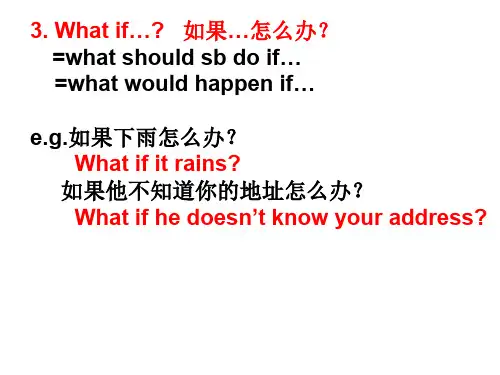
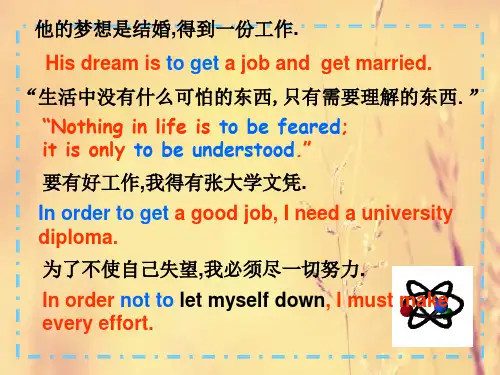
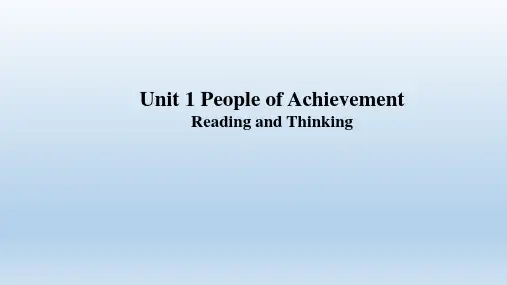
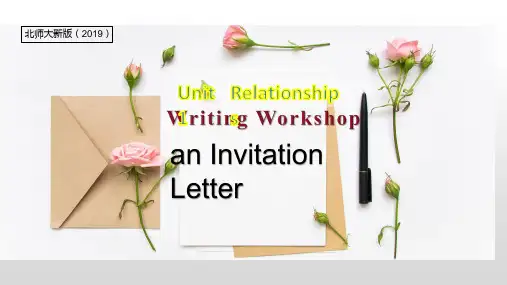
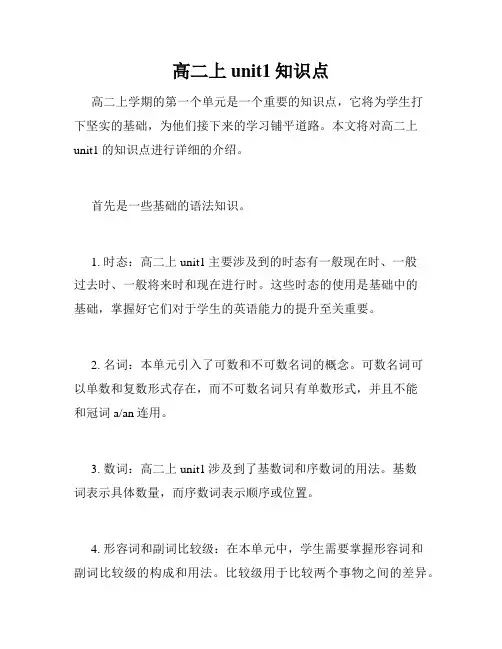
高二上unit1知识点高二上学期的第一个单元是一个重要的知识点,它将为学生打下坚实的基础,为他们接下来的学习铺平道路。
本文将对高二上unit1的知识点进行详细的介绍。
首先是一些基础的语法知识。
1. 时态:高二上unit1主要涉及到的时态有一般现在时、一般过去时、一般将来时和现在进行时。
这些时态的使用是基础中的基础,掌握好它们对于学生的英语能力的提升至关重要。
2. 名词:本单元引入了可数和不可数名词的概念。
可数名词可以单数和复数形式存在,而不可数名词只有单数形式,并且不能和冠词a/an连用。
3. 数词:高二上unit1涉及到了基数词和序数词的用法。
基数词表示具体数量,而序数词表示顺序或位置。
4. 形容词和副词比较级:在本单元中,学生需要掌握形容词和副词比较级的构成和用法。
比较级用于比较两个事物之间的差异。
接下来是单词和词汇的学习。
1. 礼貌用语:本单元涵盖了一些社交场合中常用的礼貌用语,如问候语、道歉语、感谢语等。
学生需要掌握这些用语的正确运用,以便在日常交流中表达自己的友善和尊重。
2. 学校设施和活动:在高二上unit1中,学生将学习与学校设施和活动相关的词汇。
例如,图书馆、实验室、体育馆、俱乐部等。
这些词汇将帮助学生描述他们学校的环境和各种活动。
最后是阅读理解和写作技巧。
1. 阅读理解:高二上unit1注重培养学生的阅读理解能力。
学生将接触到各种类型的文章,包括新闻报道、社论、故事等。
通过阅读这些文章,学生需要提取信息、推理和理解作者的意图。
2. 写作技巧:本单元还包括一些写作技巧,如写作的结构、语言的组织和修辞手法。
学生将学习如何撰写不同类型的文章,如叙事文、说明文和议论文,以及一些常用的写作技巧,如使用恰当的连词和过渡词。
总结起来,高二上unit1的知识点涵盖了基础语法、单词和词汇,以及阅读理解和写作技巧。
通过学习这些知识,学生将能够建立坚实的英语基础,为日后的学习奠定良好的基础。
希望本文对阅读者有所帮助。
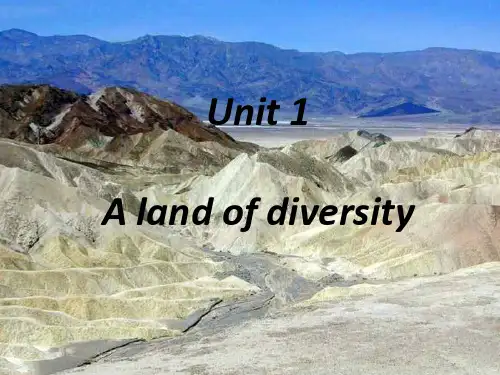
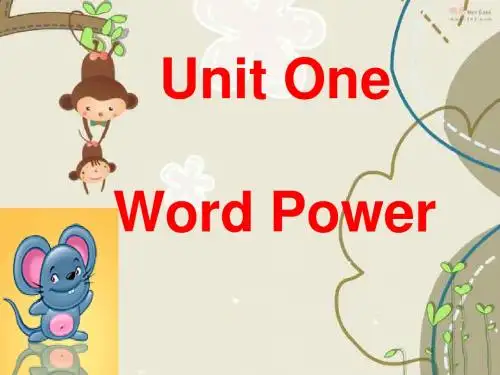

Unit1 Making a differenceⅠ.Teaching aims and demands1.Topic:Talk about science and scientists2. Function: describing people and debatingThat’s correct. It’s clear that…I doubt that …There is no doubt that…It’s hard to say.Well, maybe, but…That’s true.What’s your idea?Have you thought about…?3.Vocabularyundertake analysis within gravity similar paragraphdebate scan boundary incurable engage promise exploration disable theory seek that(adv.) misunderstand scientific method observe match predict astronomercurious microscope telescope punish intelligent patientbe similar to work on go by be/get engaged to sb. use upgo on with dream of turn out be satisfied withtake a look at the other way round on firemake a difference be curious to do sth./ about sth. / that –clause4. GrammarThe infinitive used as predictive/ adverbial / attribute / subject/ objectⅡ.The analysis of the teaching materialThe topic of this unit is “making a difference”. In this unit, first we can learn about the science subjects and know the importance of each subject. Second, we can get familiar with some great scientists and their famous quotes and achievements, such as Stephen Hawking, Galileo, Albert Einstein, ZhangHeng and so on. Third, we will know how the discoveries and inventions of the great scientists help us better understand the world and improve our life. By knowing this, students are encouraged to study hard, and their love of science and their hope of becoming scientists are inspired.1.Warming up: It offers us five pictures of foreign great scientists with their famous quotes. By learning their quotes and talking about their achievements, students can know about the key to success and make their minds to be successful.2. Listening:It contains 4 great minds including the students. In fact, it provides three passages and the students are asked to have a guess who they are, which is so interesting that it may further arouse the student s’ enthusiasm in science.3. Speaking: The students are asked to have a debate about which branch of science is the most important and useful to society. By doing so, students can practice debating skills and use some useful expressions freely. At the same time, they will find that knowledge plays an important part in our daily life.4.Pre-reading The three questions in pre-reading pave the way for reading.5.Reading: The text describes Hawking’s disease, dream, achievements and opinions on science and scientific research.6. Post-reading: The exercises help the students further understand thisgreat scientist.7. Language study It contains word study and grammar. Students will havea better knowledge of the uses of the infinitive in this part.8.Integrating skills It includes reading and writing. In the reading passage, students can learn about characteristics of five scientists and their scientific spirit. In the writing part, students are asked to write a paragraph to describe a favourite scientist.9. Tips Unit One also gives students some advice on how to use the scientific method to learn English.10. checkpointIt sums up the uses of the infinitive.Ⅲ.Teaching arrangementsPeriod 1&2: Warming up, listening and speakingPeriod 3&4: readingPeriod 5: Language studyPeriod 6: Integrating skills and writingNotes:1. Amending In warming up, it’s too abstract for the students to talk about the quotes, so we deal with it as a unit task to the students at the very beginning-―make up a column about scientists and their quotes.2. Replacement In speaking, the text gives the students the debate: Which branch of science is more important and useful to our society?It’s too difficult and abstract for the students to carry it out. The reasons are as follows:1) Their vocabulary is not large enough.2) It’s too difficult to divide each branch of science in our daily life.In fact, each branch can’t be divided from the others. Only by combining them together, can we make our world more beautiful.So we change the topic, and ask the students to talk about what has happened in our daily life. That is , should a nuclear power station be built in Sanmen? This topic can give the students lots of space to talk about.3. Adding This unit doesn’t give a good sample for the students to write about a scientist. So it is also very difficult for the students to do the writing well. Because of this, we add a research task to the students after finishing the reading material No Boundaries. (What is science and what is the spirit of a scientist? Do research on your favorite scientist and try to find out what makes him /her successful. The students are asked to finish the task by surfing the Internet.) With the help of the first unit task--- to make up a column about scientists and their quotes, it’s possible for the students to write a good article about a favorite scientist.Ⅳ.Teaching proceduresPeriod 1&2: Warming up, listening & speakingGoals:1.To encourage the students talk about the science and scientists2.To develop the students’ ability of listening for information3.To enable the students to have a better understanding of the importance of science.Teaching proceduresStep1. Warming upTask 1. Class workT: Nice to see you again. I miss you very much. And I’m glad to meet some new students here! Nice to meet you!T: What makes you get together here/ get apart with your former classmates ? Some of us learn arts/ science while others learn science / arts.Task2 Class workTask3. Pair workWhy do you learn arts/ science?I ’m good / poor at …I prefer … to …I ’m into …Because I like/ dislike...I want to beMy parents want me to …My dream is …Task4. Individual workWhat is your dream? What will you do to make your dream come true? Step2. ListeningPre-listeningHaving heard your dreams, I am glad to know all of you have great mind. I ’m sure one day you ’ll become great minds (great men /women).Before we realize our dreams, we should learn about some great minds first so that we can follow them, do you think so?Task1. Class workTask2. Individual workEnjoy the video, listen carefully and find out who are mentioned in the video. (Copernicus, Galileo, Kepler and Newton.)Task3 Pair workEnjoy once more. What are they famous for?Task4 Individual workListen to the three passages , finish the exercises and talk about the scientists. Enjoy a video and do the listening comprehension on the screen.Step3. SpeakingThanks to the discovery of Madam Curie---- Uranium ( show the slide) and the equation of Einstein ( slide ), nuclear power station can be built nowadays. It is reported a nuclear power station is being built in Sanmen. Someone says it is a good thing, while others don’t think so. (Show slides to help the students learn more about the disadvantages and advantages of it.)Task1 Group workDebating (Should a nuclear power station be built in Sanmen?)The following useful expression may give the students help.That’s correct. It’s clear that…I doubt that …That’s true. It’s hard to say. Well, maybe, but …There is no doubt that…What’s your idea? Have you thought about …? Step4. Homework1. Finish off the WB listening.2. Make up a column about scientists and their quotesPeriod 3 & 4 : Pre-reading , reading & post-readingGoals:1. To get to know something about the famous scientist Stephen Hawking.2. To learn the spirit of Hawking3. To develop some basic skills of readingTeaching ProceduresStep1. Pre-readingTask1: Class workDuring the last period, we talked about a lot of scientists and their great achievements.Can you use one adjective to describe science?Do you know any disabled scientist?Today we are going to talk about a disabled scientist.Task2. Class workEnjoy the video and guess who he is.Does he move his lips while speaking?Task3. Individual workListen and answer:1). How does he make a speech without moving his lips?(through a speech computer)2) What is it that Hawking doesn’t like about his speech computer? (It gives him an American accent.)Step2. ReadingT: Do you want to know more about Hawking? S: Yes.T: What do you want to know about him? S: his family, his achievements … T: Turn to P3Task1: Group workTask2: Individual work1) How would ordinary people feel when they were told that they had an incurable disease?2) What did Stephen Hawking do when he was told that he had an incurable disease?3) What is Hawking ’s dream?4) Read Para3 and Para4. Fill in the blanks.5. What are the steps of the scientific method?6. How do people misunderstand science?7. What is Hawking’s opinion about science?Task3. Group workNow we know that in Hawking’s opinion even the best theory can turn out to be wrong.1. Suppose Hawking’s theory of Black Holes was found wrong by himself, would he admit it ? Have a discussion and give your reasons.2. Show the students the fact with the slide.Task4.Class workHow do you understand the title “No boundaries”?Suggested answers:Unanswered questions have no boundaries.sciencein thinking.imagination.There are no boundariesbetween truth and falsehood (谬误)the healthy and the disabled.Step4.Homework:Group work research workWhat is science and what is the spirit of a scientist? Do research on your favorite scientist and try to find out what makes him /her successful.Use a library or the Internet to finish the research work./quotes/abhotswh.html/a/20040513/000320.htm/20020926/3069093.shtml/sevenlit/bacon//txt/sc/un/ot/9909unot01-01.htm/Literature/Biographies/Science/Copernicus.htm/Literature/Biographies/Science/Scients.htmPeriod 5 Word Study &GrammarGoals:1. To get the students to reflect on the useful words and phrases in this unit2. To enable the students to have a better knowledge of the uses of the InfinitiveTeaching Procedures:Step 1. Individual work1.Ask the students to tell the spirits of disabled people and what they can learn from them.2.Finish the exercises in the SB Page 5Suggested answers:1.(A)这对夫妇花光了所有的钱去找他们六个月前失踪的五岁儿子.2.(C)大家很容易看出她不高兴.3.(B)牛顿自言自语: “为什么苹果会落到地上,而不会飘向空中?”。
Unit1 单元重难点精讲Unit 1 laugh out loud一. 重要词汇1. amusement n.amuse v.amused adj.amusing adj.to one’s amusement让某人感到好笑的是with amusement津津有味地be amused to do sth. 做某事感到好笑2. apologise v. 道歉apologize to sb. for sth.apology n.make an apology to sb. for sth.3. approach v.靠近走进n. 方法路径接近approach to doing 做…的方法4. anxious adj.焦虑的be anxious about 对…焦虑担心be anxious for 渴望某事be anxious to do 渴望去做某事anxiety n. 焦虑担心渴望with anxiety 焦虑地5.entertain v.使快乐,招待entertain sb. with sth ./by doing sth. entertain sb. to 用某物招待某人entertain oneself 自娱自乐entertaining adj. 使人愉快的entertainment n.entertainment n.二. 重要短语1.look through浏览;快速查看look after照看look back on/upon回顾look into调查look up to尊敬;仰视look into 调查look out 小心当心2.cheer upcheer sb. up 使某人振作起来cheer for 为…而欢呼cheerful adj. 高兴的愉快的cheering n..欢呼喝彩adj. 令人振奋的3.more often than not大部分时候more than超过;不仅仅是;非常no more than仅仅not more than不多于……4.do the trick奏效;达到预期效果play a trick on sb. 捉弄某人trick sb. into doing sth. 欺骗某人做某事5.concentrate on /uponc oncentrate one’s mind/efforts/energy/attention on7.in turn转而,反过来;依次in return作为回报turn around转身;好转turn down调小;拒绝turn into变成turn off关闭turn out证明;结果是in turn 依次轮流in return作为回报in effect 有效地in order 按顺序in danger 处于危险中in reality /fact 事实上in advance 提前6.take off脱下,摘下;起飞;休假;开始走红take apart拆开take down记下take in吸收;理解;欺骗take on呈现;接收take over接管7.after all毕竟,终究,不管怎么说all in all总而言之in all总共;共计at all根本;全然(常用于否定句、条件句中加强语气)not at all 一点也不above all首先;最重要的是first of all首先8.in need of需要常见的“in +n.+of”短语还有:in case of万一in place of代替in spite of尽管in advance of在……前面in charge of主管……9.make sense 有意义有道理讲得通make no sense 没意义没道理讲不通make sense of 弄明白…10.put up 举起张贴建起提高putdown 放下记下长牙put out 扑灭公布put on 上演穿上put off 推迟延期put away 收起攒钱put aside 存储忽视put forward 提出提议put up with容忍忍受三.经典句式1.People sit uncomfortably on plastic chairs,looking through old magazines,all of which have been read hundreds of times previously.[自主翻译]_________________________________________________________________________________2.I speak with the on-duty nurse,who tells me that Lara’s parents rushed her to the hospital after she fell off her bicycle.[自主翻译]_________________________________________________________________________________3.Although it’s doctors and nurses who will treat her injury,it’s my job to make her feel better.[自主翻译]_________________________________________________________________________________4.Being a clown doctor means I can help people by entertaining them.[自主翻译]_________________________________________________________________________________5. We have to be very sensitive and work closely with the doctors and nurses,who keep us updated on each patient.[自主翻译]_________________________________________________________________________________6.While the doctor concentrates on examining Lara’s ankle.,I get her attention by doing a magic trick.[自主翻译]_________________________________________________________________________________7.Although she is clearly still in some pain,her scared and anxious look has been replaced—first by a small smile,and then by loud laughter as I “magically” produce her sock f rom out of my pocket.[自主翻译]_________________________________________________________________________________8.While there might be more hospital visits ahead for Lara and others,I hope that clown doctors help make it a friendlier place to visit.[自主翻译]_________________________________________________________________________________Unit 1 Using language & Developing ideas1.advertise v. advertise for 登广告招聘…advertisement n. put on advertisement 登广告2.employer n.employ v.employee n.3.essentialit is essential for sb. to do sth. It is essential that …4.impress v.impress sb. with sth.impress sth. on sb.be impressed by /with/at 对…印象深刻impression n.make/give/ leave an impression onhave/get a good impression of...对……有一个好印象impressive adj.5.deserve v.应得,应受到deserve to do sth. 应该做某事deserve doing/deserve to be done ……值得被做deserved adj.应得的deserving adj.值得帮助的6.interaction n.交流;互动interaction with...和……的互动interact vi.相互交流;相互影响interact with...与……交流/相互作用7.spot v. vt.发现,认出;点缀spot sb. doing sth. 发现某人正在做某事be spotted with...满是……的斑点spot n.斑点污点地点处所on the spot =on she scene 当场当下a historical spot 一个历史古迹put sb. on the spot使某人难堪8.whisper v.悄声说,低语n.低语;耳语whisper to sb. 与某人耳语It is/was whispered that...据秘密传闻……in a whisper=in whispers耳语地,低声地9.cruel adj. cruelty n.10.conclude v.conclude …with …conclude sth. from sth.….conclusion n.draw/reach/come to/arrive at a conclusion得出结论in conclusion 总之最后make a conclusion下结论jump to a conclusion草率下结论11.sensitive adj. 敏感的易受伤害的灵敏的be sensitive to 对..敏感sensible adj. 明智的,意识到的12.combine v. 结合,联合combine sth. with sth.把…与…结合起来be combined with 与…结合combination n. a combination with 一种…的结合物13.response n.反应回答回复in response to 作为对…的回复/反应make a response to 对…做出反应respond v. 回答相应respond to 回答…14.argue v.argue with sb. on/about/over sth.argue for /againstargue sb. into /out of doing 说服某人做/不做argument n.15.Intend v.intend to dointend sb. to dobe intended for 旨在,为..打算intention n.16.involve v. 包含涉及加入involve doing sth. 包含做某事involve sb. in doing sth. 使某人参与做…involved adj. 有关联的be involved in 被卷入,参加,与…有关二.重要短语1.tell off斥责,责骂tell a lie/lies说谎to tell (you) the truth说实话tell against sb. 对……不利tell on sb. 告发某人2.fall behind没能按时完成(工作);落在后面fall apart散架;瓦解fall down跌倒;倒塌fall off从……掉下fall over被……绊倒;倒下3.. long face 愁眉苦脸ughing stock 笑料,笑柄5.crack a smile 笑了起来6.brand of humour 某种类型的幽默7.put sb. on the spot (故意提出难以回答或尴尬的问题)使某人难堪8.tell off 斥责,责骂9. fall behind 不能按时完成(工作)10.take away 拿走11.make sense 讲得通,有意义12.put up 搭起;张贴13.look up 向上看14.in particular 尤其,特别15.due to 因为16.throw light on 使……明白17. cross out 删掉18.keep up 保持;继续经典句式1. Once,having been intived to dinner at a university,he was put on the spot when the president suddenlyasked him to give a speech.[自主翻译]_________________________________________________________________________________2.All you have to do is cross out the wrong words.[自主翻译]_________________________________________________________________________________3. “What did you say to my animals?” said the emperor,astonished .[自主翻译]_________________________________________________________________________________Unit1. Grammer ------attributive clause1.I walk through the doors into the waiting area,where there’s a familiar atmosphere of boredom and tension.2.People sit uncomfortably on plastic chairs,looking through old magazines,all of which have been read hundreds of times previously.3.I speak with the on-duty nurse,who tells me that Lara’s parents rushed her to the hospital after she fell off her bicycle.4.Scientific studies show that laughter produces chemicals to make people feel better,which means clown doctors can be helpful.非限制性定语从句是对主句中的先行词起作用的定语从句。